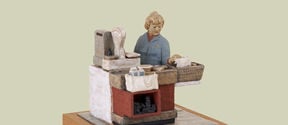“Design can be so many things”
Design historian and chief curator Kaisu Savola explains why the XXII Triennale di Milano is important to Finland, and how Aalto University hopes it will change how we define design, now and in the future.

‘My research deals with social and political values in the field of Finnish design in the 1960s and 1970s. During these decades, a new generation of design students and professionals awakened to the controversial nature of the field. In their view, design was partly to blame for overproduction, overconsumption and social inequality as long as its main objective was the cost-effective design and manufacture of desirable products. On the other hand, design could address and even solve the problems it had helped to create.
This awareness, and criticism from within the field, signalled the arrival of new values in Finnish design. Industrial and commercial objectives were replaced by ideals of equality, environmental values and political leftism. Designers took it upon themselves to improve working conditions, alleviate marginalised lives, abolish global poverty and limit the wasting of natural resources and environmental pollution.’
Kaisu SavolaLike any other field in our culture and society design is bound to change in the face of the climate crisis and growing social inequalities"
‘Design in Finland in the 1960s and 1970s has not been studied to this extent or from this perspective before. My doctoral thesis therefore offers novel insights into the history of Finnish design, which has mainly consisted of a narrow selection of iconic objects and the biographies of admired design professionals. For me, it has been important to shed light on unknown history and forgotten design projects.
Through archival sources, I discuss anonymous student work, rural craft traditions, hospital equipment, seminar posters, dairy distribution systems, industrial machinery, development projects and work ergonomics, to name a few. My research challenges established notions of what kind of design is worth studying, what design is to begin with and what it can be used for.
I also seek to reflect critically on the limits of design: are there issues that should not be solved by design? What kind of power do designers use when they are trying to ‘save the world’? Can the use of design even be harmful in the pursuit of equality and environmental protection?’
‘Like any other field in our culture and society, design too is bound to change in the face of the climate crisis and growing social inequalities. The design sector must therefore find other values and objectives than the invention of new products and supporting the growth of consumption. To some extent, this change is already underway. I hope that my research will challenge some of the big stories in Finnish design, encourage readers to reflect on the values and ideals behind design, and offer alternative perspectives on the role of design in society.
More broadly, and in my own view, the purpose of historical research is not to offer straightforward solutions or models. I believe that an interest in the past is at the heart of humanity and is valuable as such. At its best, knowledge of history helps us to develop as independent, critical and empathetic thinkers who are able to look at and interpret the present from many different perspectives.’
Kaisu Savola will defend her doctoral thesis 'Disrespectful thoughts about design' – Social, political and environmental values in Finnish design, 1960–1980' at Aalto University 24 March 2023.
Contact:
Kaisu Savola, Doctoral Researcher, School of Arts, Design and Architecture, [email protected], +358 50 5434794

Design historian and chief curator Kaisu Savola explains why the XXII Triennale di Milano is important to Finland, and how Aalto University hopes it will change how we define design, now and in the future.

Exhibition "Design for Every Body" at Design Museum explores the importance of design from the perspective of equality.



